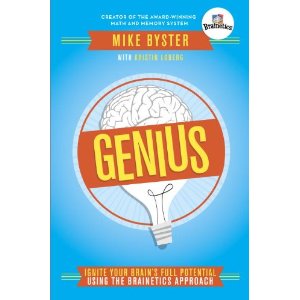A Truly Excellent Book on Genius and How to Develop It!
April 3rd, 2012 // 9:41 pm @ Oliver DeMille
Genius by Mike Byster
5 Stars
Reviewed by Oliver DeMille
I love it when a plan comes together. Okay, it isn’t really a plan. But I still love it when I read a book that says what we’ve been saying for years in Leadership Education.
I enjoy disagreeing with books too, which is why I love to talk about Lord of the Flies or 1984 with people who have read them repeatedly and given them a lot of thought.
But today I read a book that agreed with much of what I wrote about in A Thomas Jefferson Education and that I’ve been speaking and writing about for a long time.
I had the same experience when I read The Talent Code by Daniel Coyle, Unschooling Rules by Clark Aldrich, The Global Achievement Gap by Tony Wagner, and A Whole New Mind by Daniel Pink.
Today’s book was Genius by Mike Byster.
Those who have followed Leadership Education and Thomas Jefferson Education (TJEd) know that we have long taught that all people on the planet have genius within them, and that it is a fundamental purpose of good education to help them find and develop their genius.
Byster goes a step further, by teaching the reader how to develop one’s areas of inner genius, and the result is a truly excellent book.
Those familiar with Leadership Education will resonate with several recurring themes.
For example, Byster argues that a major problem with modern education is that we put too much emphasis on teaching subjects rather than helping students learn how to effectively learn and think.
He quotes Albert Einstein and Alvin Toffler, respectively: “I never teach my pupils; I only attempt to provide the conditions in which they can learn,” and “The illiterate of the 21st Century will not be those who cannot read and write, but those who cannot learn, unlearn, and relearn.”
Most significantly, at least for me, Byster outlines a plan or pattern of teaching and learning genius.
Again, many of the themes are familiar to me, but they are couched in new ways and combined with new concepts, examples and ideas that make the book an instant classic for me. I’ll read it again and again.
Byster teaches the following “Six Skills of A Genius,” and gives suggestions and exercises for mastering them:
- Focus
- Concentration
- “Retaining Massive Amounts of Information Without ‘Memorizing’” (This is accomplished by making learning fun, exciting and otherwise engaging one’s own love of learning and areas of passionate interest.)
- Thinking Outside the Box
- Organization (This includes finding patterns in things and reorganizing information to better intersect with one’s own mind and world.)
- Forgetting
What a great outline. I especially like the last one, which reminds me of counsel I often gave to freshmen and sophomores: “Only take notes on things you deeply care about and want to remember, rather than just summarizing whatever lecture you attend.”
Not trying to remember things you don’t want to recall is a vital part of remembering the important things.
Again, this book resonated with me in so many ways that I was excited to go back and read it again.
The first time I just read it through, then I spent the evening and long into the night reading it a second time and taking copious notes.
Maybe the most enjoyable thing about this book is that many of the exercises are focused on math.
I hope that doesn’t stop anybody from reading it, because it was some of the most enjoyable and downright fun math I’ve done since…well, ever.
This was a very entertaining, pleasurable, amusing book. I learned so much! I recommend it everyone, whether you know anything about TJEd or not.
For those with a background in Leadership Education, I think you’ll love this book as much as I did. Principles of truth are principles of truth, after all, and this book is full of such principles.
I add it to A Beginner’s Guide to Constructing the Universe by Michael Schneider as one of my all-time favorite books on math, and also as one of the best books on “Leadership Education.”
Read it, love it, have fun with it. Enjoy!
***********************************
 Oliver DeMille is the co-founder of the Center for Social Leadership, and a co-creator of Thomas Jefferson Education.
Oliver DeMille is the co-founder of the Center for Social Leadership, and a co-creator of Thomas Jefferson Education.
He is the co-author of New York Times, Wall Street Journal and USA Today bestseller LeaderShift, and author of A Thomas Jefferson Education: Teaching a Generation of Leaders for the 21st Century, and The Coming Aristocracy: Education & the Future of Freedom.
Oliver is dedicated to promoting freedom through leadership education. He and his wife Rachel are raising their eight children in Cedar City, Utah.
Category : Blog &Book Reviews &Education &Featured &Leadership &Mission












Keith
13 years ago
I prefer an education in meaning. List all the abstract nouns you can and then pick one at a time and think, study, talk, and write about it. Define each word within the context of “taking responsibility” and not as a “subjective bias” and in time you will develop a conceptual ability that can actually move faster than the linguistic record, which is seen when people are trying to record and capture. I would not call the later genius. Based on the outline of that book, the demand for the conservation of responsibility in all meaning is missing. For instance, there is no direction to define anything. Give a student the word love, ask him to define it, and you quickly see their understanding. They either show active responsibility in their meaning or they do not. As for thinking outside the box, try thinking outside the iron bubble.